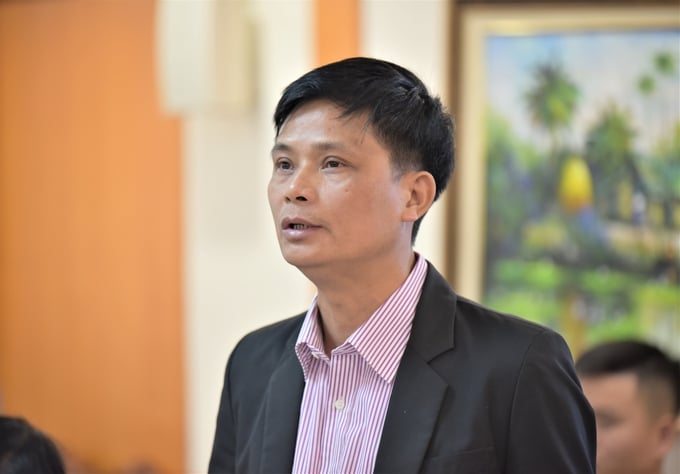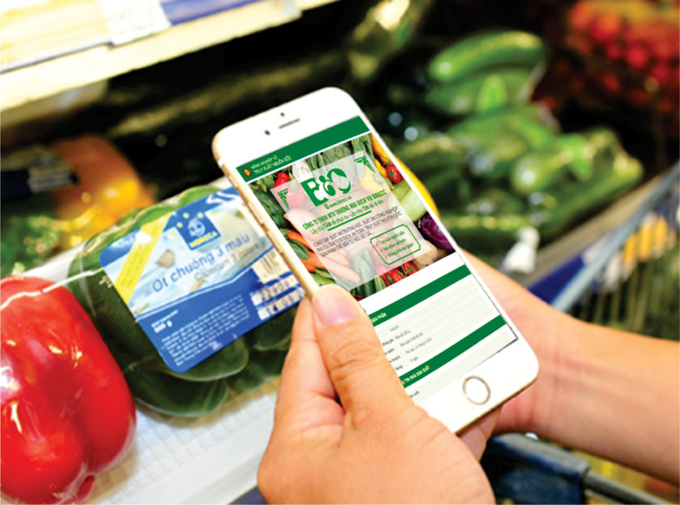November 25, 2025 | 12:19 GMT +7
November 25, 2025 | 12:19 GMT +7
Hotline: 0913.378.918
November 25, 2025 | 12:19 GMT +7
Hotline: 0913.378.918

Mr. Nguyen Hoai Nam, Center for Digital Transformation and Agriculture Statistics (MARD).
At the “Promoting digitalization in agro-product and food traceability forum”, to Mr. Nguyen Hoai Nam, Center for Digital Transformation and Agriculture Statistics (MARD) shared about the MARD's origin traceability system.
It comprises three primary components: a website for origin traceability; a system for information management, updates, and date on origin traceability for state management agencies and firms; and a mobile app for verifying, tracking, and searching for product origin.
MARD officially implemented and operates the system, which is maintained by the Center for Digital Transformation and Agricultural Statistics (MARD) at http://checkvn.mard.gov.vn/. The system is ready to connect to other systems, including the National Origin Traceability Portal and other Ministerial and local level traceability systems. Today, the system is linking and exchanging data with eight provincial and municipal systems, as well as the sugar cane industry's tracability system. It now includes information on the traceability of about 3.964 firms and 16,987 agroproducts.
MARD has overcome problems such as a diverse variety of objects under control such as pesticides, veterinary medications, industrial feeds, fertilizers, fisheries, forestry, and food safety in order to develop the system. As a consequence, many management needs, for many objects, necessitate investment and upgrading, as well as the involvement of the Ministry's specialized management units.
Nevertheless, the implementation and deployment of the origin traceability system incurs significant costs, with the majority of the burden falling on the private sector.

Agricultural production in Vietnam has remained small and fragmented, with limited adoption of high-tech tools such as monitoring systems, censor systems, navigation systems, AI, and IoT to track and check automatically, ensuring transparency in data collection and updates into the origin traceability system.
The last barrier to overcome is an asynchronous system, a subpar paper, and sophisticated information security.
According Mr. Nam, having a system standard is critical.
To guarantee the effective functioning of the Vietnamese and international traceability systems, the origin traceability system must fulfill the requirements and standards of the Minister of Science and Technology and related ministries.
It must guarantee synchrony and consistency for simple management and control, as well as traceability in the supply chain in terms of backward and forward traceability.
The system's standardization also seeks to provide compatibility and flexibility, with the capacity to simply update, expand and connect, integrate, and exchange data; boost efficiency and effectiveness; and ensure information security and safety.
Mr. Nam advocated that the traceability of agricultural goods in particular, and other products in general, be established and developed in the direction of linkage, interconnection, and concentration in order to complete the system. Whereas the legal corridor should be detailed and established to ensure systematic and consistent data establishment and acceptance. He also advocated that the criteria for standards and criteria be established at the national level as soon as possible.

(VAN) Viettel is applying automation technology that helps Vietnamese agro-products clear customs more quickly, cut costs, and maintain quality.

(VAN) Vinh Long, Viet Nam’s ‘coconut capital,’ is facing a major opportunity to advance sustainable agriculture by reducing carbon emissions from cultivation.

(VAN) Ho Chi Minh City still has many areas for improving forest quality, saving energy, reducing emissions, and generating carbon credits.

(VAN) ILDEX Vietnam 2026 will connect more than 250 exhibitors and 10,000 visitors from 40 countries.

(VAN) Hue City is accelerating efforts to combat IUU fishing, aiming to remove EC’s 'yellow card' and promote sustainable fisheries development.

(VAN) The recent torrential downpours and unprecedented flooding in the Southern Central Coast are a highly unusual meteorological and hydrological event.

(VAN) The Southern Central Coast and Central Highlands regions have suffered massive agricultural losses, with over 80,000 hectares of rice and crops, alongside millions of livestock, being swept away, causing severe damage to farmer livelihoods.